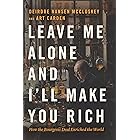Learn more
These promotions will be applied to this item:
Some promotions may be combined; others are not eligible to be combined with other offers. For details, please see the Terms & Conditions associated with these promotions.
- Highlight, take notes, and search in the book
- In this edition, page numbers are just like the physical edition
Your Memberships & Subscriptions

Download the free Kindle app and start reading Kindle books instantly on your smartphone, tablet, or computer - no Kindle device required.
Read instantly on your browser with Kindle for Web.
Using your mobile phone camera - scan the code below and download the Kindle app.

Follow the author
OK
Beyond Positivism, Behaviorism, and Neoinstitutionalism in Economics Kindle Edition
In Beyond Positivism, Behaviorism, and Neoinstitutionalism in Economics, Deirdre Nansen McCloskey zeroes in on the authoritarian cast of recent economics, arguing for a re-focusing on the liberated human. The behaviorist positivism fashionable in the field since the 1930s treats people from the outside. It yielded in Williamson and North a manipulative neo-institutionalism. McCloskey argues that institutions as causes are mainly temporary and intermediate, not ultimate. They are human-made, depending on words, myth, ethics, ideology, history, identity, professionalism, gossip, movies, what your mother taught you. Humans create conversations as they go, in the economy as in the rest of life.
In engaging and erudite prose, McCloskey exhibits in detail the scientific failures of neo-institutionalism. She proposes a “humanomics,” an economics with the humans left in. Humanomics keeps theory, quantification, experiment, mathematics, econometrics, though insisting on more true rigor than is usual. It adds what can be learned about the economy from history, philosophy, literature, and all the sciences of humans. McCloskey reaffirms the durability of “market-tested innovation” against the imagined imperfections to be corrected by a perfect government. With her trademark zeal and incisive wit, she rebuilds the foundations of economics.
- ISBN-13978-0226818313
- PublisherThe University of Chicago Press
- Publication dateJune 30, 2022
- LanguageEnglish
- File size1.7 MB
Kindle E-Readers
- Kindle Paperwhite (10th Generation)
- Kindle Oasis (10th Generation)
- Kindle Paperwhite (11th Generation)
- Kindle
- Kindle Paperwhite
- Kindle (10th Generation)
- All new Kindle paperwhite
- Kindle Scribe (1st Generation)
- Kindle Voyage
- Kindle Oasis (9th Generation)
- Kindle Paperwhite (5th Generation)
- All New Kindle E-reader (11th Generation)
- Kindle Touch
- All New Kindle E-reader
- Kindle Oasis
Fire Tablets
Customers who bought this item also bought


 Leave Me Alone and I'll Make You Rich: How the Bourgeois Deal Enriched the WorldDeirdre Nansen McCloskeyKindle Edition
Leave Me Alone and I'll Make You Rich: How the Bourgeois Deal Enriched the WorldDeirdre Nansen McCloskeyKindle Edition
Editorial Reviews
Review
"A compact discussion of some crucial issues economists should be contemplating." ― The Enlightened Economist
“This new book deepens the continuing conversation in Humanomics. It’s essentially about discovering Adam Smith and resuming a path that McCloskey has so magnificently helped to reinvigorate in the last half century.” -- Vernon Smith, Chapman University and 2002 Nobel Laureate in Economics
“The manuscript is a collection of writings for various forums, many reviews of others and many replies to critics. One unifying theme is a critique of neoinstitutional economics. But yet another theme is a defense of the bourgeois trilogy against its critics. This book is well worth a read.” -- Richard Langlois, University of Connecticut
About the Author
Deirdre Nansen McCloskey is distinguished professor emerita of economics and of history, and professor emerita of English and of communication, at the University of Illinois at Chicago.
Product details
- ASIN : B0B3Q61XWW
- Publisher : The University of Chicago Press (June 30, 2022)
- Publication date : June 30, 2022
- Language : English
- File size : 1.7 MB
- Text-to-Speech : Enabled
- Screen Reader : Supported
- Enhanced typesetting : Enabled
- X-Ray : Not Enabled
- Word Wise : Enabled
- Print length : 228 pages
- Best Sellers Rank: #1,116,417 in Kindle Store (See Top 100 in Kindle Store)
- #223 in Macroeconomics (Kindle Store)
- #521 in Economic Theory (Kindle Store)
- #775 in Macroeconomics (Books)
- Customer Reviews:
About the author

Discover more of the author’s books, see similar authors, read book recommendations and more.
Customer reviews
- 5 star4 star3 star2 star1 star5 star40%37%23%0%0%40%
- 5 star4 star3 star2 star1 star4 star40%37%23%0%0%37%
- 5 star4 star3 star2 star1 star3 star40%37%23%0%0%23%
- 5 star4 star3 star2 star1 star2 star40%37%23%0%0%0%
- 5 star4 star3 star2 star1 star1 star40%37%23%0%0%0%
Customer Reviews, including Product Star Ratings help customers to learn more about the product and decide whether it is the right product for them.
To calculate the overall star rating and percentage breakdown by star, we don’t use a simple average. Instead, our system considers things like how recent a review is and if the reviewer bought the item on Amazon. It also analyzed reviews to verify trustworthiness.
Learn more how customers reviews work on AmazonTop reviews from the United States
There was a problem filtering reviews. Please reload the page.
- Reviewed in the United States on June 18, 2023Written by the Cato institute with all the shallow pompousness of the Friedman clones it churns out year after year. The emphasis on the individual, the human, leaves people atomized and defenseless against exploitation - just where “free market” forces want them. If your six year old isn’t already working for a living it is due to state institutions and not the invisible hand of the market. If you consider human well-being to be a right and not manure for profit opportunities, it will be state institutions that secure that outcome, not benevolent capitalists or market forces.
Worth skimming to understand the current version of neo-liberal polemics. My recommendation: once you skim, return the book - the author can enjoy the fruits of their cynical labors with lack of effective demand.








